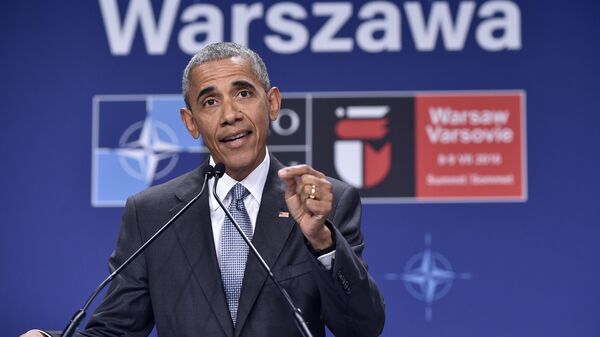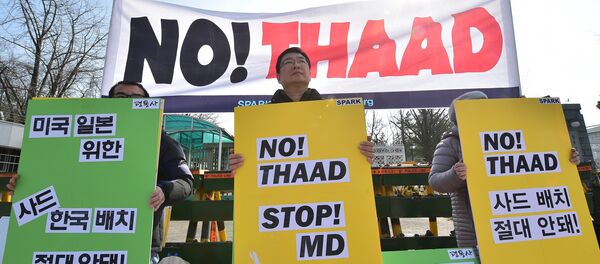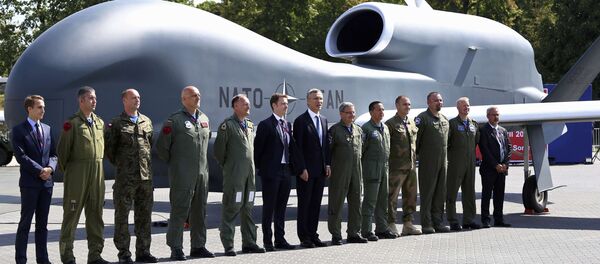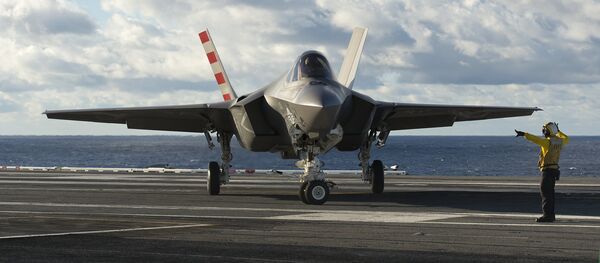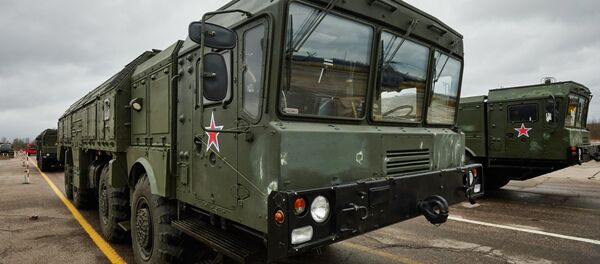In a pithy analysis for the independent news and analysis resource PolitRussia, Bortsov lays out the Pentagon's military strategy, and why Washington's allies have every reason to be concerned.
Unfortunately, Bortsov lamented, "only after South Korean authorities signed the agreement with the US did the residents of Seongju county realize the shining prospects" of US missile defense for their region.
County head Kim Han-hong complained to South Korean media that "the residents of our district are outraged by this unilateral administrative decision. We were not even told why it was our county which was chosen to host the missile defense system."
"What can we say?" Bortsov asked. "Bad luck. Now, not only is it already too late to protest against the construction of one of the most powerful man-made sources of electromagnetic radiation; the THAAD deployment will also turn the area into a giant 'target here' mark on the map. Washington is firmly prepared to defend South Korea from all sorts of threats from the north, even if not a single Korean is left to defend in the end."
In Eastern Europe too, the commentator added, the US, eager to avoid direct confrontation with Russia, nonetheless gladly signs its allies up for conflict against Russia.

Commenting on the US system's South Korean deployment, defense analyst and former Pentagon employee F. Michael Maloof explained recently that "this system greatly exceeds North Korea's existing capabilities. It was created for intercepting ICBMs, whereas North Korea is most likely to use tactical missiles. [THAAD] is not adapted for the interception of tactical weapons…Second, the system's installation will automatically make the region a target for Pyongyang. Third, there are problems associated with radiation. In my opinion, the US is doing this exclusively for political reasons."
Bortsov, meanwhile, warned that the Pentagon's drive to deploy missile defense may have ulterior motives, which were explained almost a decade ago by Russian military officials.
"The GBI anti-missile missiles are created on the basis of the Minuteman medium range ballistic missile, even using the same launchers," the analyst recalled. "Back as 2008, Colonel Vladimir Vasiliev pointed out that there was no mention in the [US tech] about an In-Flight Interceptor Communications System, without which it was not possible for it to work as a missile defense system. But launching the missiles to strike at ground targets is entirely within the realm of possibility."
In other words, Bortsov noted, both Russia and China are aware that the US systems may in fact be offensive in nature. In the meantime, NATO officials continue to claim that the systems are defensive.
Commenting recently about the start of construction of the US ABM base at Redzikowo, northern Poland, NATO Secretary General Jens Stoltenberg insisted that this system is "in no way directed against Russia…So any action from Russia will be absolutely without reason. It will be unjustified because they know that this is not directed against them."
Meanwhile, Bortsov commented, "for some reason this 'long term investment' is persistently being built right next to Russia. For example, in Poland everything has been agreed upon. The US missile defense base in Redzikowo, to be completed in 2018, is only 150 km from Russia's Kaliningrad region."

As in Korea, it's too late. In Romania, the US missile defense system has already stepped into combat duty. In Estonia, Lithuania and the Czech Republic negotiations are underway. The US is attempting to convince the Netherlands and Slovakia, and even non-NATO members Finland and Sweden, to host bases.
"And that's only from the European side," Bortsov recalled. "There is also Georgia, which has always welcomed such proposals, plus ideas to integrate Canada into the US missile defense system. But Russia, naturally, is concerned first and foremost with the 'offensive missile defense' being built close to our borders."
In any case, US officials hardly attempt to hide their real intentions. In testimony before the House Appropriations Committee back in February, Defense Secretary Ash Carter explained that the US "must have – or be seen to have – the ability to impose unacceptable costs on an advanced aggressor that will either dissuade them from taking provocative action, or make them deeply regret it if they do."

"It's an old trick," Bortsov suggested. "The goal is to scare US opponents and force them to spend themselves to exhaustion – the US still has more money in the end. This is why the US is increasing its 2017 European budget five-fold. Still, if they are counting on Russia to break from the strain, they're being naïve."
For now, Bortsov noted, the US, "in possession of a printing press, can afford such expenditures."
The problem lies elsewhere. Last year, Yevgeny Lukyanov, the deputy head of the Russian Security Council, warned that Romania and Poland's participation in US missile defense automatically makes them targets for Russian military planners.
"The deployment of elements of missile defense, which target our strategic nuclear forces, is a problem for them. They automatically become the targets of our military…If they like being targets due to the deployment of US weapons systems, that's their choice," Lukyanov said.
Russian President Vladimir Putin repeated this sentiment recently, suggesting that Russia will now have "no choice" but to target the Eastern European countries where US missile defense is deployed. "If yesterday people simply did not know what it means to be in the crosshairs in those areas of Romania, then today we will be forced to carry out certain measures to ensure our security. And it will be the same with Poland," he said.
Unfortunately, the real problem is that Washington policy makers, just as they did in the last century, "use NATO for US gain, ignoring the interests of its allies. For Washington, these are just pawns…We do not reject dialogue with NATO, and want to peacefully resolve the issues which have arisen. But, as rightly pointed out by Kremlin press secretary Dmitri Peskov, 'it's not Russia that's approaching [NATO's] borders,' (but the other way around)."
